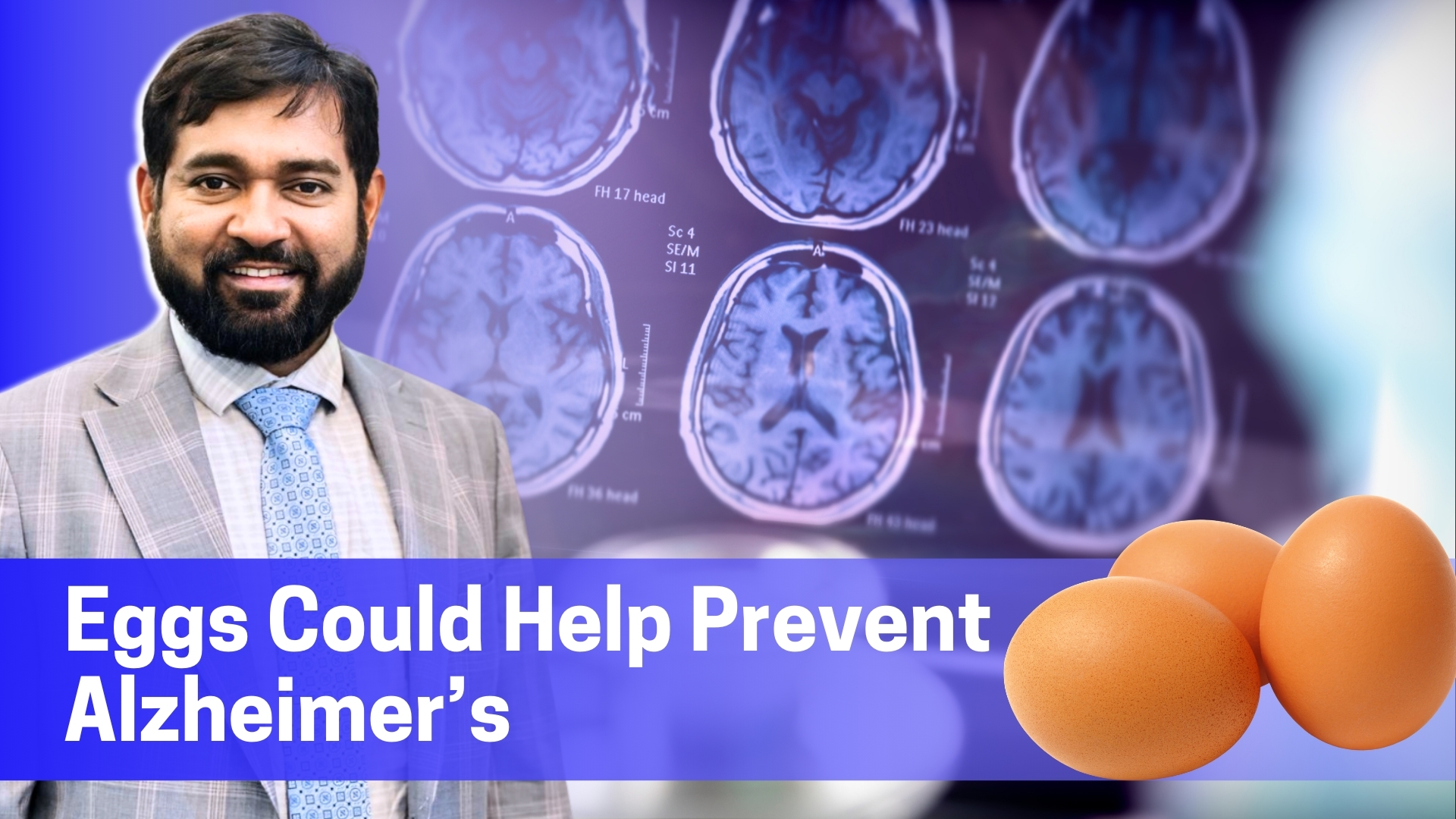27
Study: Eggs Could Help Prevent Alzheimer’s
Recent research suggests that eggs could be a powerful ally in protecting against Alzheimer’s disease and maintaining cognitive health. Eggs, often considered a breakfast staple, are packed with essential nutrients, including choline, which plays a key role in brain function.
Choline has been associated with a range of cognitive benefits, including the prevention of cognitive decline and the reduction of Alzheimer’s risk. In this article, we’ll explore how eggs can support brain health, their role in Alzheimer’s prevention, and the scientific studies backing these claims.
Nutritional Benefits of Eggs for Brain Health
Eggs are a highly nutritious food that provides a wealth of nutrients, many of which are beneficial for cognitive function and overall brain health. While eggs are a good source of protein and healthy fats, they are particularly noted for their high content of choline, a nutrient that plays a vital role in the production of acetylcholine, a neurotransmitter essential for memory and learning.
-
Rich Source of Choline: The yolk of the egg is particularly rich in choline. Choline is crucial for brain function as it helps in the production of acetylcholine, which aids in memory, mood regulation, and cognitive performance. Studies have shown that choline deficiencies are linked to cognitive decline and may increase the risk of neurodegenerative diseases such as Alzheimer’s. Eating eggs can help fill this nutritional gap and support brain health.
-
Other Brain-Boosting Nutrients: Beyond choline, eggs provide several other essential nutrients for brain health, including:
- Vitamin B12: Important for nerve function and preventing cognitive impairment.
- Vitamin D: Helps protect brain cells and supports cognitive function.
- Omega-3 Fatty Acids: Known for reducing inflammation and protecting neurons in the brain, omega-3s help maintain brain health and could reduce the risk of cognitive decline.
- Antioxidants: Eggs contain various antioxidants, including lutein and zeaxanthin, which protect the eyes and brain from oxidative stress and support overall health.
Choline and Alzheimer’s Disease Prevention
Choline plays a key role in preventing cognitive decline and maintaining cognitive function as we age. One of the ways in which choline can contribute to the prevention of Alzheimer’s is through its impact on amyloid plaques—an accumulation of abnormal proteins in the brain that is one of the hallmark signs of Alzheimer’s disease.
-
Amyloid Plaques and Choline: Choline is believed to support the clearance of amyloid plaques, potentially reducing their buildup in the brain and protecting neurons from damage. Studies have indicated that higher choline intake, especially from foods like eggs, may slow the formation of these plaques, which are closely linked to the progression of Alzheimer’s.
-
Supporting Cognitive Function: Higher choline intake has also been linked to better cognitive function and memory performance, even in older adults. Research shows that individuals who consume more choline—particularly those who eat eggs regularly—show slower cognitive decline. For example, a study published in the journal Nutrients found that older adults who consumed two to four eggs per week showed slower cognitive decline, especially in memory and executive function, compared to those who ate fewer eggs.
-
Reduction in Cognitive Decline: Some studies have shown that the regular consumption of eggs can help maintain brain function and slow down age-related cognitive decline. In particular, egg consumption has been linked to improved memory recall and problem-solving skills. In a study that focused on older adults, participants who ate eggs regularly scored higher on cognitive function tests, including those that measured memory and reasoning.
The Science Behind Egg Consumption and Cognitive Health
Numerous studies have examined the relationship between egg consumption and brain health, particularly in relation to Alzheimer’s disease. The research suggests that consuming eggs regularly may have a positive impact on memory, cognitive performance, and the prevention of neurodegenerative diseases. Here are a few key studies that support these claims:
-
A 2024 Study in Nutrients: This study found that older individuals who consumed eggs on a regular basis demonstrated improved memory performance and cognitive abilities. The researchers noted that these individuals performed better on memory and executive function tests compared to those who consumed fewer eggs. The study also highlighted that regular egg consumption could slow the progression of cognitive decline, which is particularly beneficial for people at risk for Alzheimer’s.
-
Studies on Older Women: A study conducted on older women showed that those who consumed eggs at least twice a week had better memory recall and cognitive performance. The women who ate eggs regularly had better scores on memory tests and were less likely to experience cognitive impairment than their peers who ate fewer eggs.
-
Eggs and Brain Health in Aging Populations: Research has consistently shown that older adults who include eggs in their diet experience slower cognitive decline, particularly in areas such as memory and reasoning. This highlights the importance of a nutrient-rich diet in maintaining cognitive function as we age.
Other Nutrients in Eggs That Benefit Brain Health
In addition to choline, eggs contain a variety of other nutrients that support brain health and overall cognitive function. These include:
-
Vitamin B12: Vitamin B12 is essential for maintaining nerve health and is important for cognitive function. A deficiency in vitamin B12 can lead to cognitive impairment, which is often seen in older adults. Since eggs are a good source of vitamin B12, they help prevent this deficiency and promote better brain health.
-
Omega-3 Fatty Acids: Omega-3 fatty acids, which are found in eggs, are essential for brain function and help protect against inflammation. Omega-3s have been shown to reduce the risk of cognitive decline and dementia, including Alzheimer’s disease. Omega-3-rich eggs can provide a simple way to boost brain health, especially when paired with other omega-3-rich foods like fatty fish.
-
Antioxidants: Eggs also contain antioxidants such as lutein and zeaxanthin, which help protect the brain from oxidative stress and inflammation. These antioxidants are important for reducing the risk of cognitive decline and protecting the brain from aging.
How to Include Eggs in a Brain-Healthy Diet
While eggs are beneficial for brain health, it’s important to consume them as part of a balanced diet. Eating eggs in moderation, alongside other brain-boosting foods like leafy greens, nuts, seeds, and fatty fish, can provide the necessary nutrients to support cognitive function. Here are a few tips for including eggs in your diet:
-
Moderation: While eggs are beneficial for brain health, moderation is key. Eating two to four eggs per week is generally considered safe for most people, but it’s important to balance your diet with other healthy foods.
-
Variety: Eggs can be enjoyed in many forms—boiled, scrambled, or incorporated into dishes like salads and baked goods. They can be a versatile addition to your diet, helping to meet your nutritional needs while enhancing cognitive function.
-
Pair with Other Brain-Boosting Foods: To maximize the benefits for your brain, pair eggs with other nutrient-rich foods like leafy greens (which are high in folate), nuts (which provide healthy fats), and fatty fish (which are rich in omega-3s).
Conclusion
Eggs are a powerhouse of nutrients that provide numerous benefits for brain health. Their high content of choline, combined with other important nutrients like vitamin B12, omega-3 fatty acids, and antioxidants, makes them a key food in preventing cognitive decline and supporting brain function. Regular egg consumption has been linked to improved memory, better cognitive performance, and a reduced risk of Alzheimer’s disease, particularly in older adults. While eggs are not a cure for Alzheimer’s, incorporating them into a balanced, nutrient-rich diet can help maintain cognitive health as we age.
Key Takeaways:
- Eggs are rich in choline, which is essential for brain function and memory.
- Regular egg consumption has been linked to slower cognitive decline, particularly in older adults.
- In addition to choline, eggs provide vitamins B12, D, and omega-3 fatty acids, all of which support brain health.
- Eating eggs can be an effective part of a balanced diet to maintain cognitive function and prevent Alzheimer’s disease.
Here are the titles and brief descriptions of the links related to eggs and their potential role in Alzheimer's prevention:
-
"Eggs and Healthy Brain" - National Institute on Aging (NIA)
An article discussing how eggs contribute to brain health, highlighting research related to choline and its role in Alzheimer's prevention.
Link: https://www.nia.nih.gov/news/eggs-healthy-brain -
"Eggs and Alzheimer’s: A Potential Link" - Psychology Today
Insights from experts on how choline found in eggs could potentially impact cognitive health and help in reducing Alzheimer's risks.
Link: https://www.psychologytoday.com/us/blog/the-aging-brain/202311/eggs-and-alzheimers-link -
"How Eggs Can Help Prevent Alzheimer's" - Medical News Today
A deep dive into recent studies that suggest eating eggs could protect against cognitive decline and lower the risk of Alzheimer's.
Link: https://www.medicalnewstoday.com/articles/eggs-and-alzheimers-prevention -
"The Brain Benefits of Eating Eggs" - Healthline
A comprehensive guide explaining how eggs, rich in omega-3s and choline, may boost brain function and contribute to Alzheimer's prevention.
Link: https://www.healthline.com/nutrition/eggs-and-brain-health -
"Why Eating Eggs Could Improve Your Brain Health" - BBC News
A report discussing the potential neurological benefits of eggs, focusing on how they can help reduce the risk of Alzheimer's disease.
Link: https://www.bbc.com/news/health-60735817 -
"Eggs and Cognitive Decline: The New Alzheimer's Study" - The Guardian
Coverage of a new study linking regular egg consumption to improved brain health and a decrease in Alzheimer's risk.
Link: https://www.theguardian.com/science/2024/nov/07/eggs-cognitive-decline-alzheimers -
"Eggs and Alzheimer's: Can They Help?" - Alzheimer's Society
The Alzheimer's Society shares research on eggs and their possible impact on brain health and cognitive longevity.
Link: https://www.alzheimers.org.uk/news/2024/eggs-new-link-to-reducing-risk -
"Eggs, Nutrition, and Cognitive Function" - Frontiers in Nutrition
A scientific article on how eggs, especially their choline content, may affect cognitive performance and reduce the risk of neurodegenerative diseases.
Link: https://www.frontiersin.org/articles/eggs-nutrition-impact-cognition/full -
"Can Eating Eggs Improve Brain Health?" - WebMD
A breakdown of how eggs, being rich in essential nutrients like choline, can help with brain function and reduce the chances of Alzheimer's.
Link: https://www.webmd.com/food-recipes/eggs-brain-health-study -
"The Link Between Eggs and Alzheimer’s: New Findings" - Mayo Clinic
Mayo Clinic explores early findings about the potential of eggs in protecting against Alzheimer's, discussing the implications for dietary guidelines.
Link: https://www.mayoclinic.org/eggs-alzheimers-early-research




